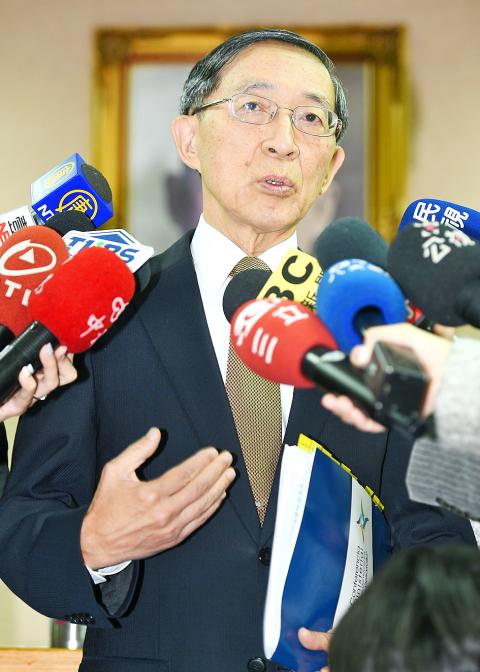Following China’s abrupt resumption of diplomatic ties with Taiwan’s former ally the Gambia, an official from the Ministry of Foreign Affairs yesterday expressed concerns over the nation’s relations with African diplomatic ally Sao Tome and Principe.
The legislature’s Foreign Affairs and National Defense Committee invited Minister of Foreign Affairs David Lin (林永樂) and ministry officials to answer questions regarding China’s decision on Thursday last week to establish diplomatic ties with the Gambia, which unilaterally severed its 18-year relationship with Taiwan on Nov. 14, 2013.
When fielding questions from Democratic Progressive Party (DPP) Legislator Lo Chih-cheng (羅致政) on whether Taiwan would suffer “an avalanche of ruptured diplomatic ties” in the wake of the Gambia incident, Lin said Taiwan’s ties with all of its 22 diplomatic allies are stable, including Guatemala, Panama and the Holy See.

Photo: Chang Chia-ming, Taipei Times
Lin also dismissed former minister of foreign affairs Francisco Ou’s (歐鴻鍊) remarks on Sunday that all of Taiwan’s diplomatic allies desire to establish diplomatic ties with China.
“Ou’s statement is not entirely correct, but some of our diplomatic allies do harbor the illusion of forging diplomatic relations with China,” Lin said.
DPP Legislator Chiu Chih-wei (邱志偉) asked ministry officials to rate each of Taiwan’s diplomatic allies on a “red,” “yellow” and “green” scale in terms of the soundness of the nation’s respective relationships with them.
All of the nation’s diplomatic allies were rated “green,” suggesting stable ties, except for Sao Tome and Principe, which was rated “yellow” by Department of West Asian and African Affairs Director-General Chen Chun-shen (陳俊賢).
Chen said he did not dare to give a “green” rating to the relations between Taiwan and Sao Tome and Principe.
Downplaying Chen’s “yellow” rating, Lin later said that the problem with Taiwan-Sao Tome and Principe ties lay mostly with Sao Tomean President Manuel Pinto da Costa, adding that a presidential election is due later this year.
Since Taiwan has maintained a close relationship with Sao Tomean Prime Minister Patrice Trovoada, who holds more power than the president, there is no crisis in the bilateral ties, Lin said.
Pinto da Costa visited Shanghai and Beijing in a private capacity in June 2014, with the stated goals of soliciting investment in the African nation’s deep-water harbor and promoting economic development.
During the committee meeting yesterday, legislators across party lines also passed an impromptu motion aimed at lodging a protest against China over its resumed ties with the Gambia.
Additional reporting by Chen Yu-hsuan

UKRAINE, NVIDIA: The US leader said the subject of Russia’s war had come up ‘very strongly,’ while Jenson Huang was hoping that the conversation was good Chinese President Xi Jinping (習近平) and US President Donald Trump had differing takes following their meeting in Busan, South Korea, yesterday. Xi said that the two sides should complete follow-up work as soon as possible to deliver tangible results that would provide “peace of mind” to China, the US and the rest of the world, while Trump hailed the “great success” of the talks. The two discussed trade, including a deal to reduce tariffs slapped on China for its role in the fentanyl trade, as well as cooperation in ending the war in Ukraine, among other issues, but they did not mention

Japanese Prime Minister Sanae Takaichi yesterday lavished US President Donald Trump with praise and vows of a “golden age” of ties on his visit to Tokyo, before inking a deal with Washington aimed at securing critical minerals. Takaichi — Japan’s first female prime minister — pulled out all the stops for Trump in her opening test on the international stage and even announced that she would nominate him for a Nobel Peace Prize, the White House said. Trump has become increasingly focused on the Nobel since his return to power in January and claims to have ended several conflicts around the world,

CALL FOR SUPPORT: President William Lai called on lawmakers across party lines to ensure the livelihood of Taiwanese and that national security is protected President William Lai (賴清德) yesterday called for bipartisan support for Taiwan’s investment in self-defense capabilities at the christening and launch of two coast guard vessels at CSBC Corp, Taiwan’s (台灣國際造船) shipyard in Kaohsiung. The Taipei (台北) is the fourth and final ship of the Chiayi-class offshore patrol vessels, and the Siraya (西拉雅) is the Coast Guard Administration’s (CGA) first-ever ocean patrol vessel, the government said. The Taipei is the fourth and final ship of the Chiayi-class offshore patrol vessels with a displacement of about 4,000 tonnes, Lai said. This ship class was ordered as a result of former president Tsai Ing-wen’s (蔡英文) 2018

GLOBAL PROJECT: Underseas cables ‘are the nervous system of democratic connectivity,’ which is under stress, Member of the European Parliament Rihards Kols said The government yesterday launched an initiative to promote global cooperation on improved security of undersea cables, following reported disruptions of such cables near Taiwan and around the world. The Management Initiative on International Undersea Cables aims to “bring together stakeholders, align standards, promote best practices and turn shared concerns into beneficial cooperation,” Minister of Foreign Affairs Lin Chia-lung (林佳龍) said at a seminar in Taipei. The project would be known as “RISK,” an acronym for risk mitigation, information sharing, systemic reform and knowledge building, he said at the seminar, titled “Taiwan-Europe Subsea Cable Security Cooperation Forum.” Taiwan sits at a vital junction on